Why are Chinese Apps So Annoying?
1 July ’19
微博 (weibo, the Chinese Twitter), will send me eight notifications about new posts on accounts that I don’t follow when I open the app. I’m already on the app, what is the point of sending me notifications? Annoying.
淘宝 (taobao), one of the online shopping giants, will forgo the built in notification system and instead choose to overlay an image that just looks like a notification on the top of your screen. If you tap on it it will bring you to the app, but if you try and swipe it away it will also bring you to the app. Annoying.
Every time I make a payment with 支付宝 (zhifubao “Alipay”) I get a notification from Alipay, a text message from Alipay, and a notification from my bank about how much I spent. Annoying.
Apps like 腾讯动漫 (tengxun dongman “Tenecent Manga”) or QQMusic will frequently send notifications along the lines of “Hey you haven’t used [appname] in a while! Come check out this new release!” Annoying.
飞猪 (feizhu “flying pig”, a travel app) will hijack my lock screen, taking over the whole thing to display a single custom notification as soon as I turn on my phone screen (before I’ve even unlocked it!). Annoying.
Every time you open some apps, they will display a blocking pop up informing you that there’s a new version of the app available, and that it has such and such new features, and that such and such percent of people have already upgraded, and that if you really want to be one of the cool kids you should install the new version right now. Annoying.
In a similar vein many apps will also display a blocking pop-up with some offers and discounts every time you open the app. It sounds nice, but these discounts are often for less than a dollar, or only usable in very specific circumstances. Annoying.

微波 (weibo, the Chinese Twitter) sending me a notification about a new post when I'm already in the app.
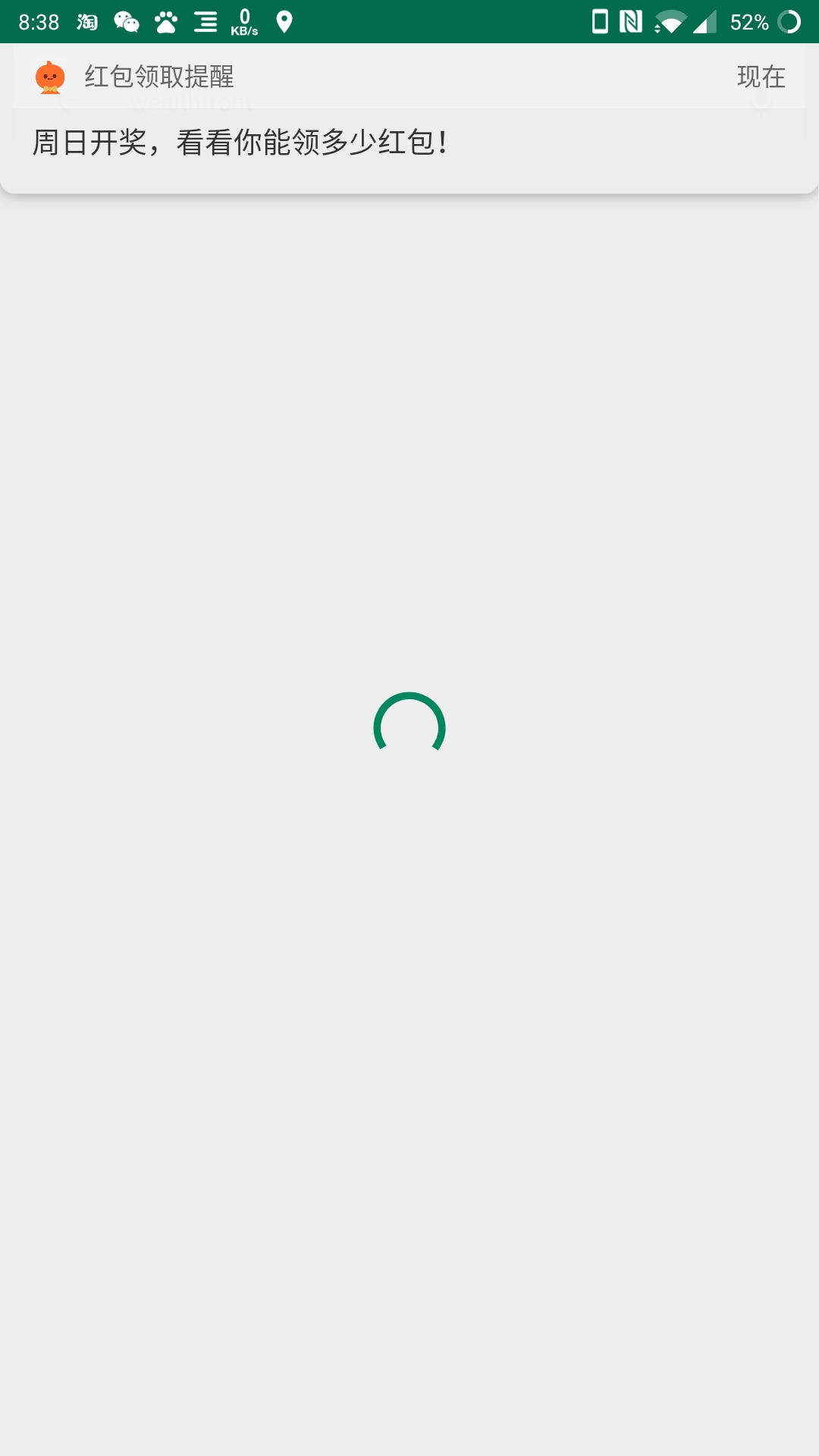
淘宝 (taobao, one of the Chinese Amazons) sending me a fake notification that I can't dismiss - I just have to wait a second or two for it to go away. Notice how it almost but not quite looks like the notification on the left.
These irritating behaviors, it is my belief, all stem from the Google ban. When Google was banned the primary app distribution center for the rest of the world, Google Play store, was also banned. Google Play gets flak from time to time about not doing a good job filtering out malicious apps or having too many low-quality apps in the store, but I’ve never witnessed any of the above behaviors in any app I’ve ever downloaded from the Google Play store.
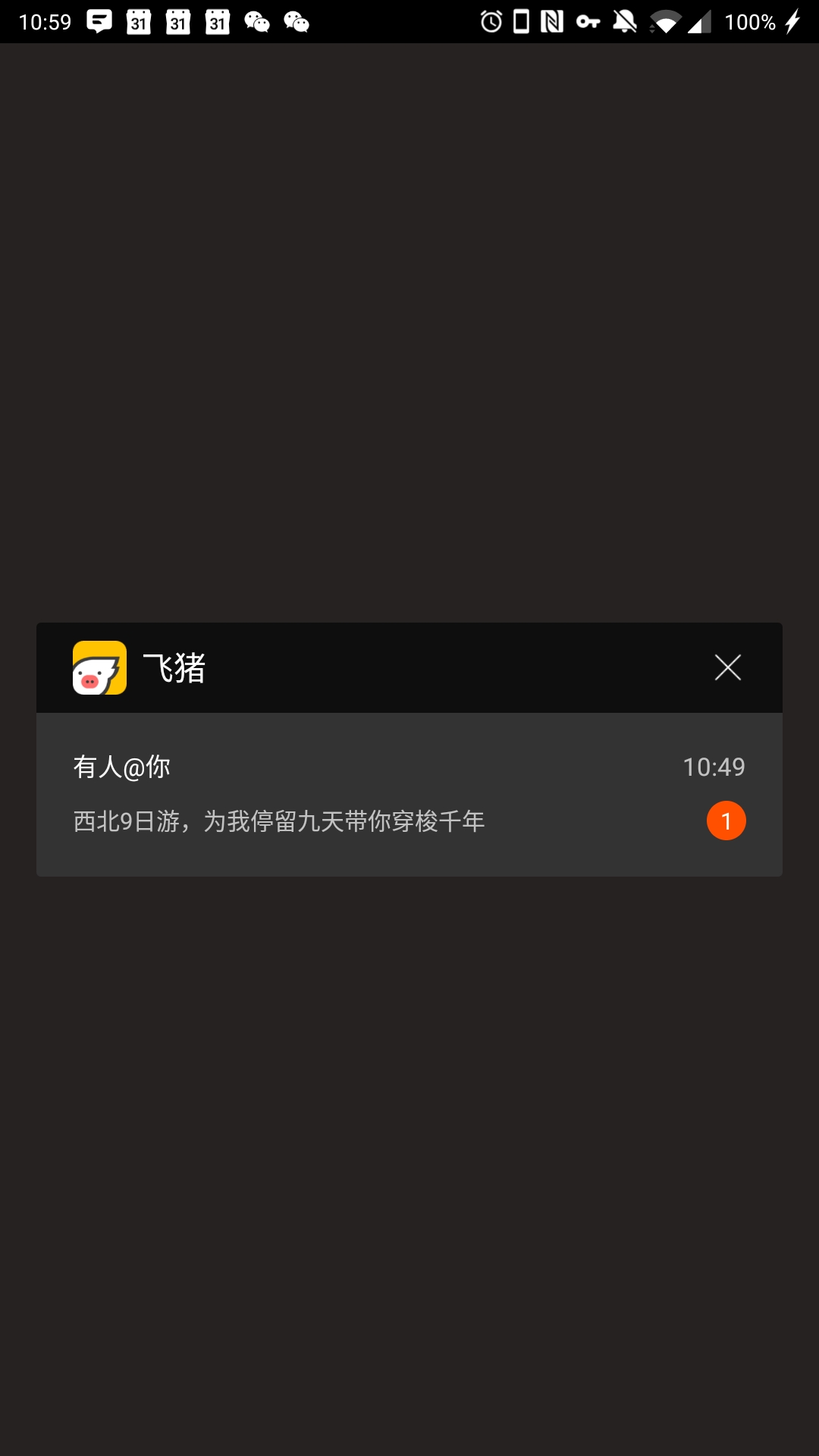
飞猪 (feizhu, "Flying Pig", a travel app) takes over my whole lock screen just to display their fake notification. Here it says "Hey you there? There's a 9 day trip to the Northwest, let me take you a thousand years back in history for 9 days."
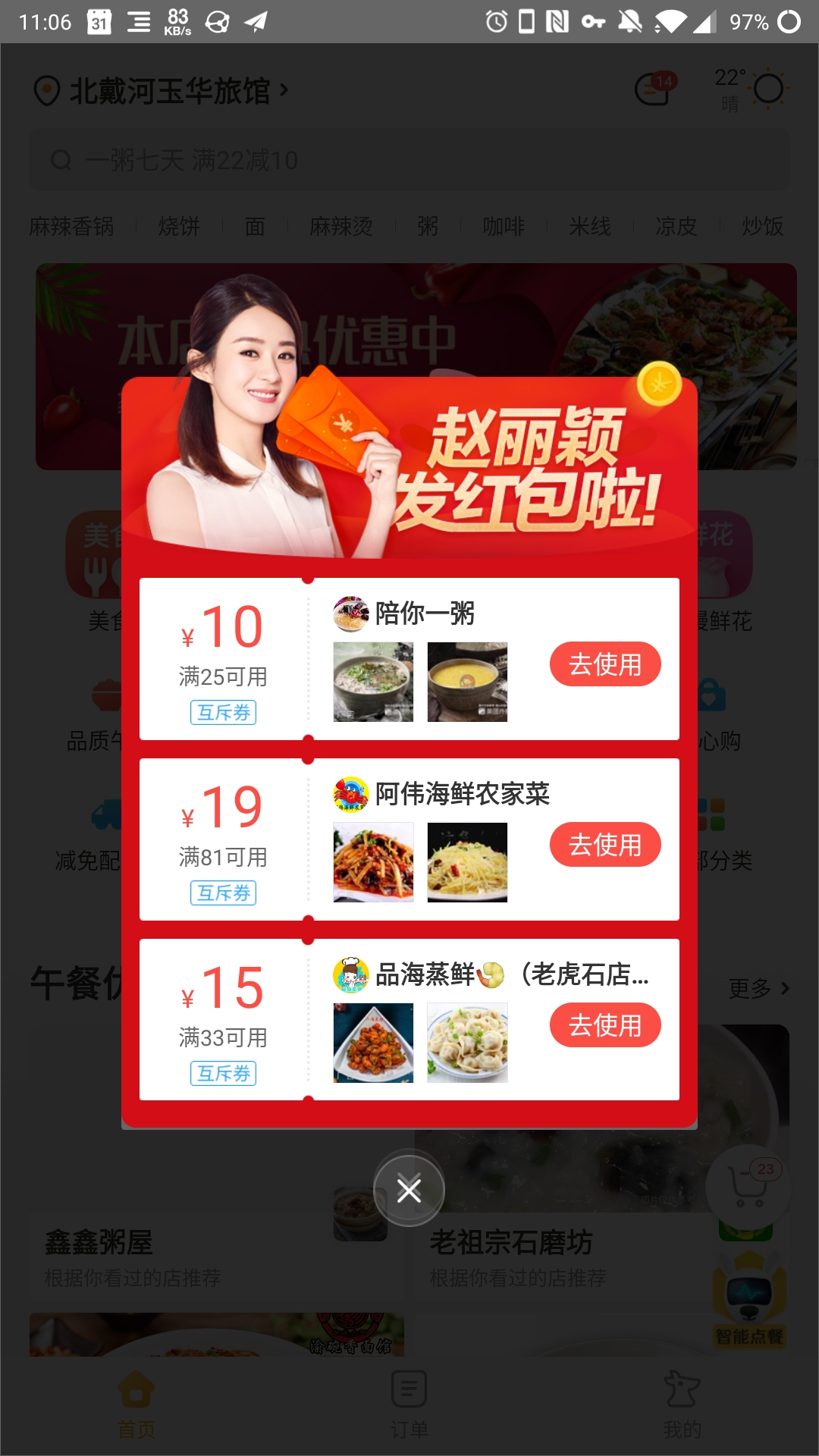
红包 (hongbao "red packets") being offered in 煤团外卖 (meituan waimai) a food delivery app. But they're all incredibly specific - 10元 ($1.5) off if you order 25元 ($3.5) or more from this store, 19元 ($2.75) off if you order 81元 ($11.75) or more from this store, and 15元 ($2) off if you order 33元 ($4.75) or more from this store. I usually don't even pay attention.
The problem is that incentives are not correctly aligned. The most commonly used replacement app manager is 应用宝 (yingyongbao “app treasure”) which is published by 腾讯 (tengxun “Tenecent”). But this would be like letting Facebook regulate itself. Of course the Tenecent app store is not going to prevent Tenecent Comics or QQMusic (also a Tenecent app) from annoying users every single day with notifications about new releases. And if they don’t filter this behavior in their own apps they certainly can’t do it for competitors (like Weibo). So the arms race for attention plays out without the dampening influence of Google’s app reviews, and you end up with really annoying apps.
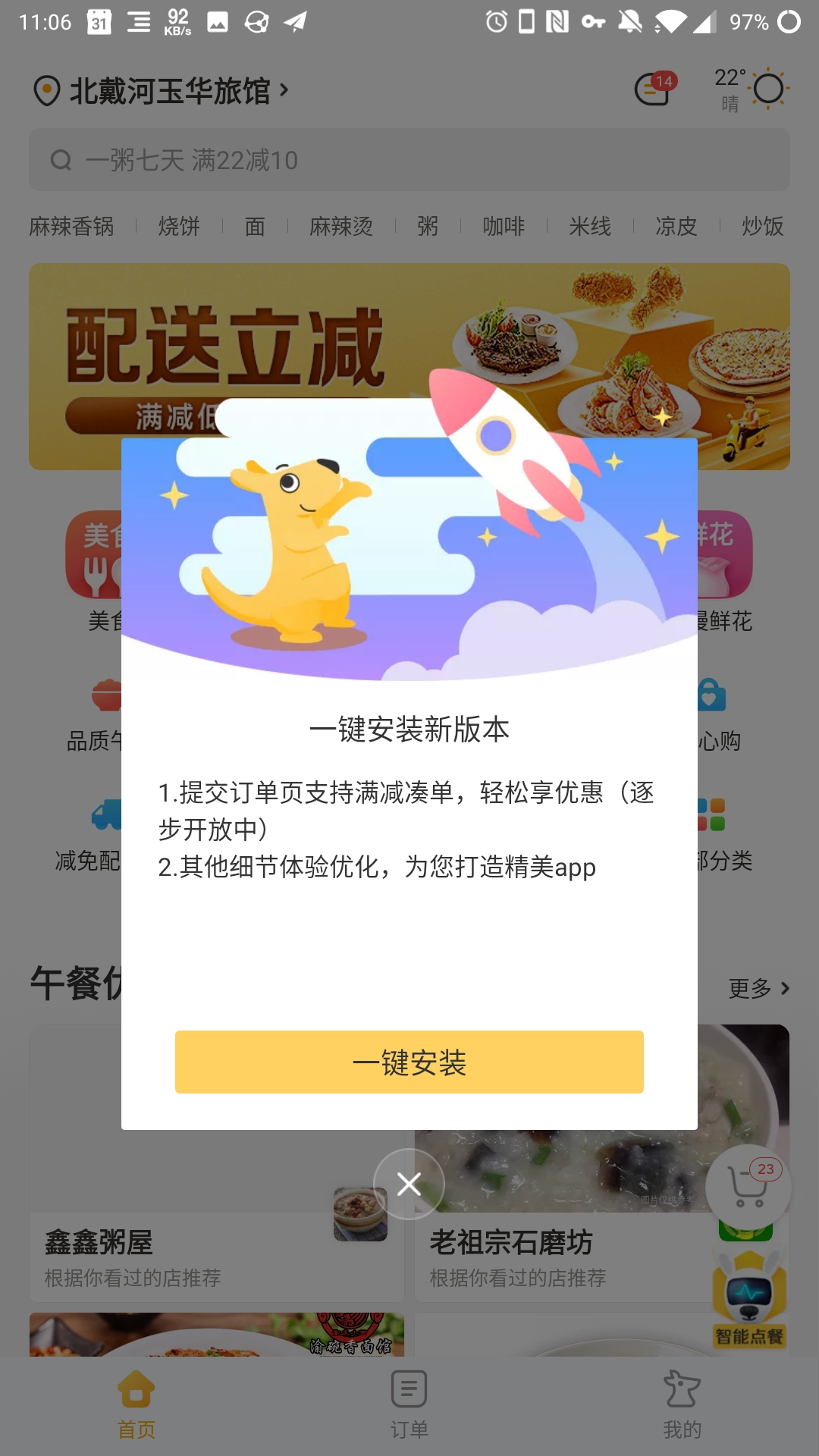
美团外卖 (meituan waimai) informing me that there's a new version of the app. Usually I have to dismiss this *and* the red packets to finally be able to use the app.
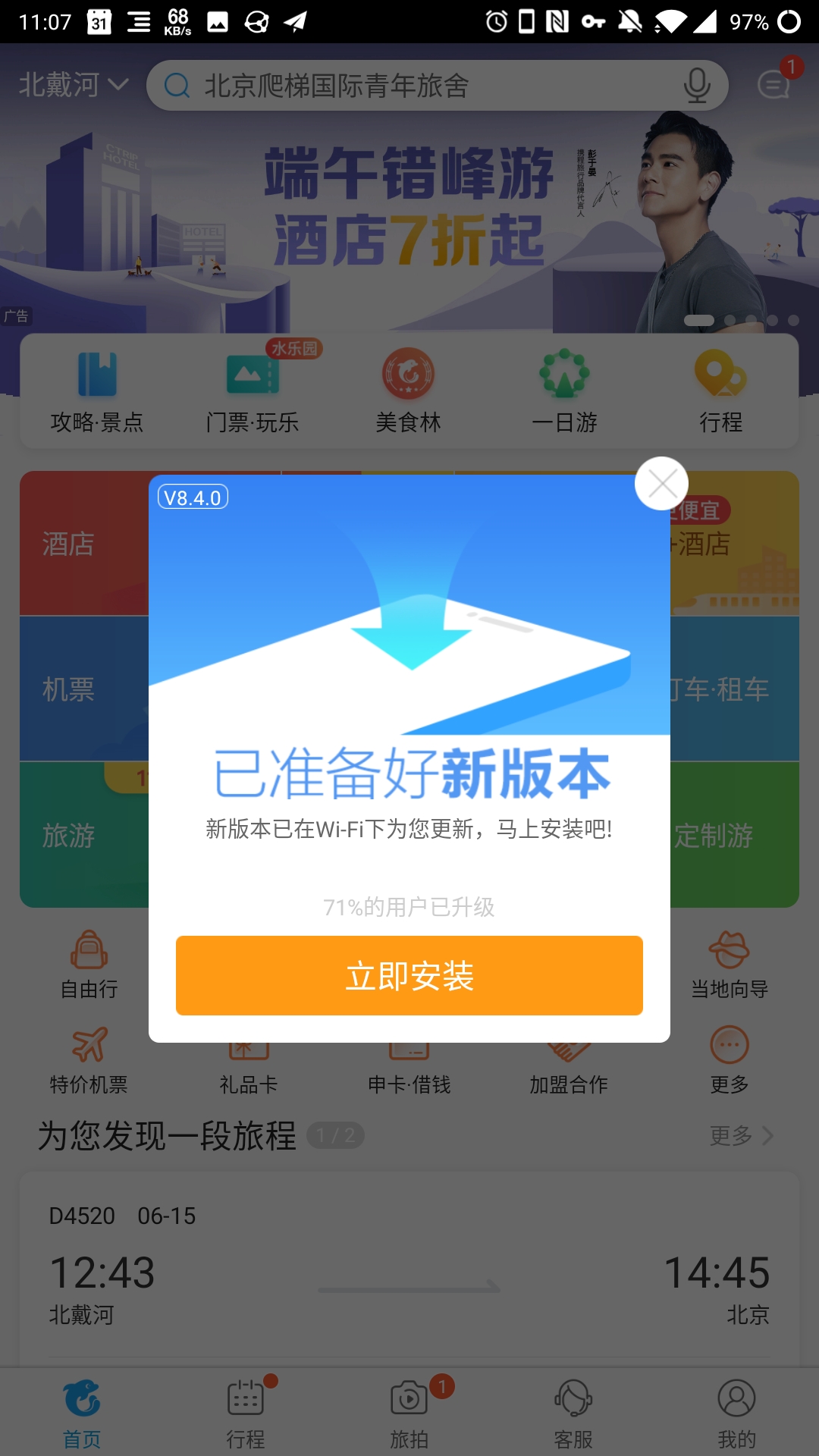
携程 (xiecheng, a travel app) informing me that there's a new version of the app. "71% of users have already upgraded" it says "Install now!"
If that weren’t bad enough, 应用宝, the app manager, itself is one of the most annoying apps itself! Upon installation the first thing it does is try to get you to install 21 more apps. Once you navigate your way around that you are presented with an actual app store, but with an extra gamified “phone optimization score”, which I managed to receive only a 57 on. I believe it’s related to how up to date your apps are, or how “clean” your phone is. The kicker on top of all this is the permanent banner that they add to your notifications, telling you at all times how much space you could free on your phone if you use their little utility. Annoying as hell.
And the nail in the coffin is that since Tenecent controls WeChat, the one app every Chinese user is guaranteed to have on their phone, the ability to reach (coerce, nearly) users into using their app center is just the natural next step. If you are like most Chinese users, and turn to WeChat to search for that cool app your friend is using, Tenecent will first have you install their app manager, which will then in turn install the app you were actually interested in. Actually this is exactly how they got me the first time. But now, if you don’t know any better, you’re stuck with their app manager.
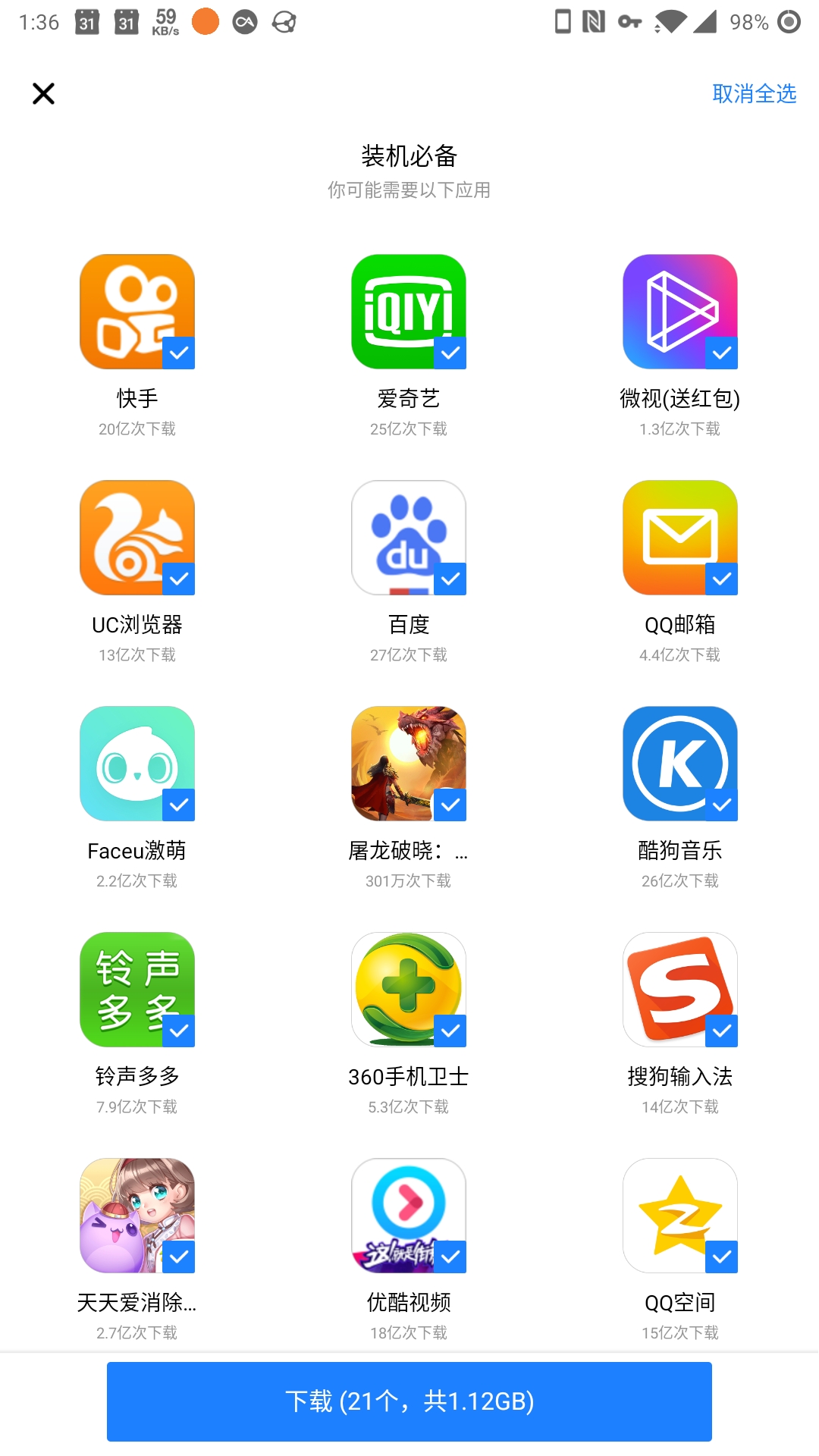
应用宝 (yingyongbao, an app manager) trying to get me to install *21 more apps* right after I've opened it for the first time.
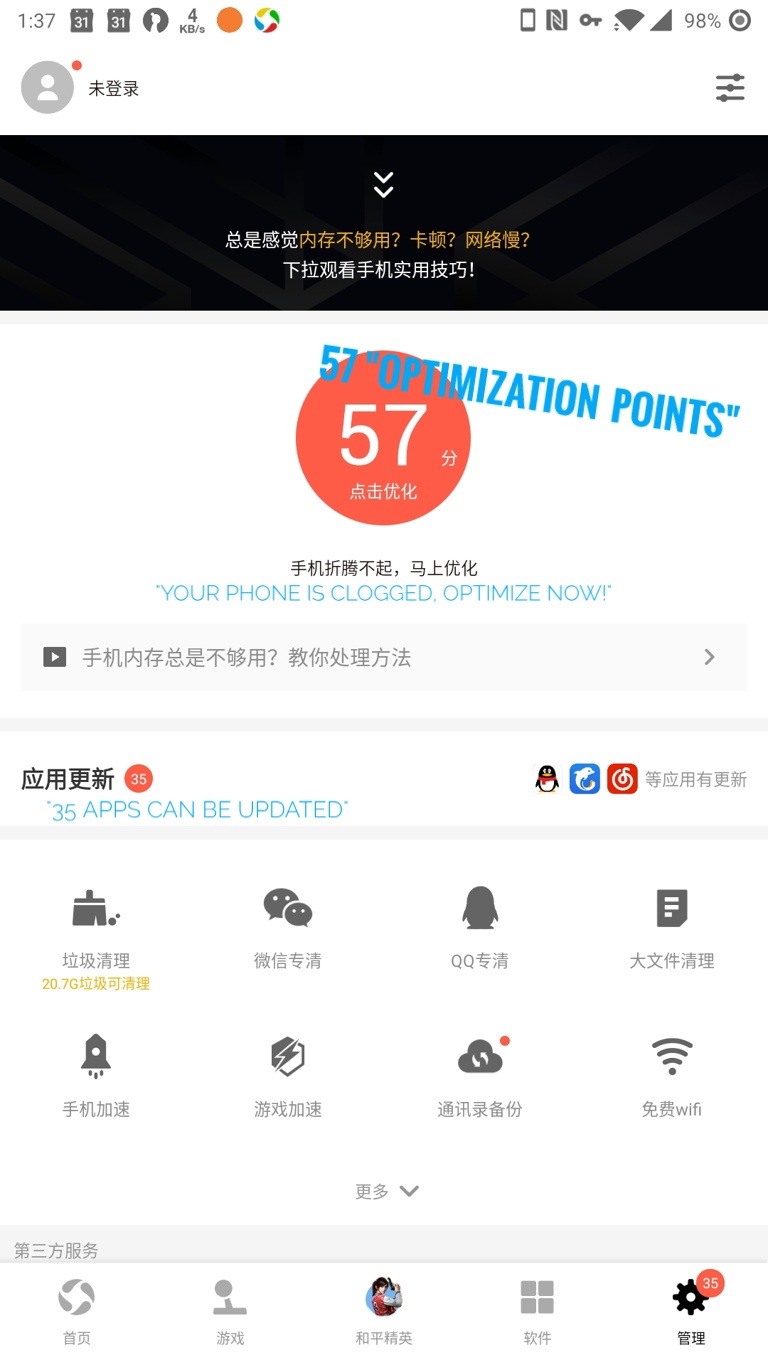
应用宝 (yingyongbao, an app manager) informing me that I have only managed to score 57 of their "optimization points." Clearly I am a bad phone owner.
Unsurprisingly, the other place the vast majority of the Chinese population go to information retrieval, 百度 (Baidu), also has an app manager. But, of course, it is equally annoying.
There are other smaller alternatives - the one I use is called “CoolApk”, and it’s not nearly as annoying. It has, for reasons inexplicable to me, a social network built in, but it’s easy to ignore. However in the end they don’t have the influence to exercise any sort of app review process that would weed out irritating app behaviors - the problem boils down to clout. It’s certainly true that outside of China one can distribute an Android app on marketplaces other than Google Play (FDroid is an alternative for strictly free and open source software), but if you want to reach 99.9% of users your only choice is Google Play. That means that Google Play standards de facto become Android app standards - in everywhere but China.
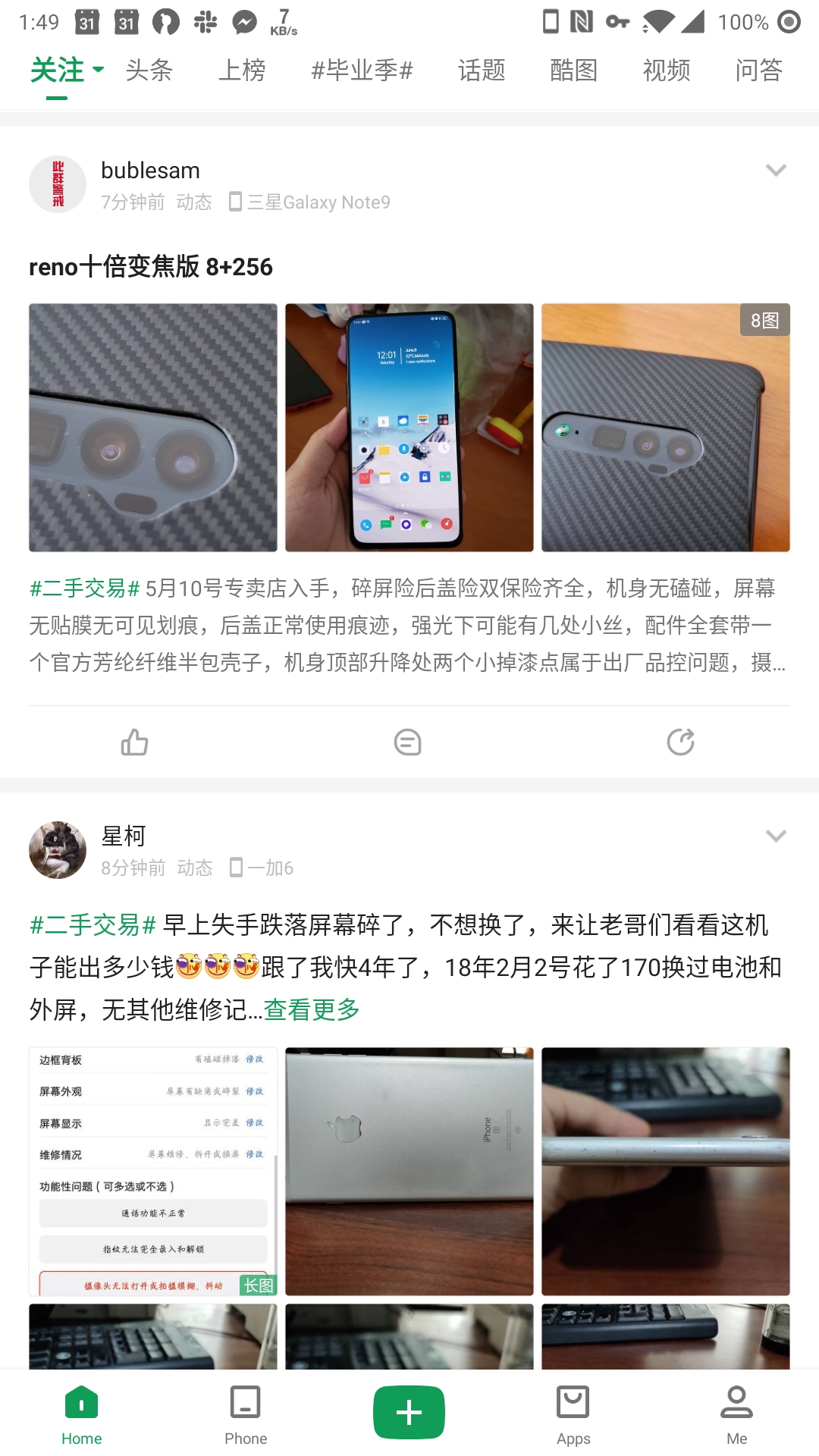
The social newsfeed that exists on the app manager I use (CoolAPK). You can see a little "Apps" button down on the lower right, which is all I really care about.
Take a look as I try to watch a video on 腾讯视频 (tengxun shipin "Tenecent Video") and am, for some reason, redirected to 京东 (jingdong, a shopping app), which thrashes around showing me the same banner add and set of red packets over and over until I take mercy and kill it.
Apple, of course, took a different route. Apple does not allow alternative marketplaces on their mobile products - meaning that when they moved into China they had to start complying with the Chinese government’s demands to take certain apps (like social media or international news) off the app store. But they still retained control over their app store, so Chinese apps for iPhone had to pass their famously strict reviews. Which means, crucially, that Apple could keep them from being so annoying.
The newest iPhones here are actually more expensive than in the US. Chinese people will ask their friends going to the States to buy them a new iPhone and bring it back. This seems ridiculous to me, as the phones are manufactured here in China, but I suppose this is one of the lesser absurdities of late stage Capitalism. I was surprised to find that many of my fellow interns valued an iPhone over and Android, as I had assumed that it would be harder to bypass censorship on an iPhone since the app store was at the mercy of the Chinese government. But after spending a month receiving tens of superfluous notifications a day, I understand now. For many people the reduced freedom is worth the peace of mind.
There’s a side note here that could turn into a post itself about how this is the fundamental trade-off that you get using Apple products - decreased freedom for an increased peace of mind. I am very much not a fan of this trade-off and love the power of being a superuser on my Android. But China is a look into what happens if tech companies are allowed free reign. In the US we have two checks: the government and the free market. But the Chinese government’s primary concerns are censorship of information and limiting video games (another separate topic of itself), not stymieing their growing tech sector. And the hand of the free market has no power here because many (most ?) Chinese people simply cannot afford an iPhone. In theory, economics would predict the emergence of an more strict app store that people would pick up and use, but of course the apps are already out in the wild, app stores have already claimed their market shares, and users have already been trained…
So what can one do in this twisted market? Well first of all, like I already mentioned, there are alternative app markets. That’s one big nuisance out of the way. One of my friends simply refuses to install any apps on his phone (hi 响 (Xiang)) - opting instead to only ever use the lighter and less intrusive WeChat version of the app. Exacerbating all my problems is the fact that I am interacting with these applications in my second language. There are probably ways to limit the number of notifications, or turn off the permanent banner, but I don’t know the Chinese word for “notification”. For me to go through every app’s settings, painstakingly translating all the options in order to find and disable all the behaviors I don’t like - well it would take a whole afternoon! Using Chinese apps makes me feel like an old grandpa using a phone - I have to stare at the screen for thirty seconds before choosing an option and half the time I’m just guessing (apologies to any old grandpas reading my blog 😂). Once I’ve figured out how to get the app to do a minimum of what I want it to do I don’t often have the time or inclination to come back and tailor it further to my needs - as I would be able to do in an English language app.
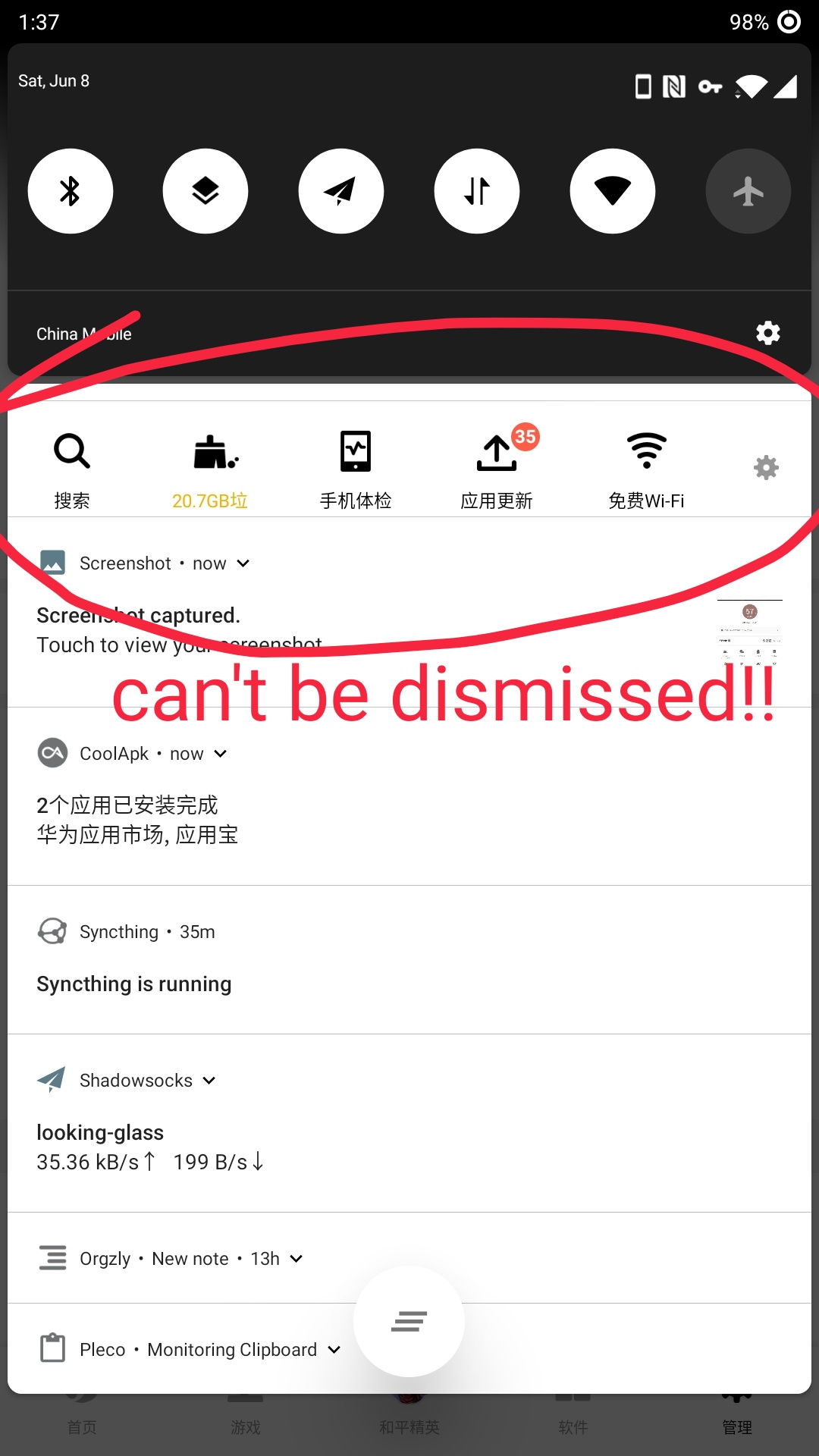
Not only can it not be dismissed, but it's constantly reminding me how much space I could clean up if I used their utility, or how many apps I can upgrade... Incredibly annoying.
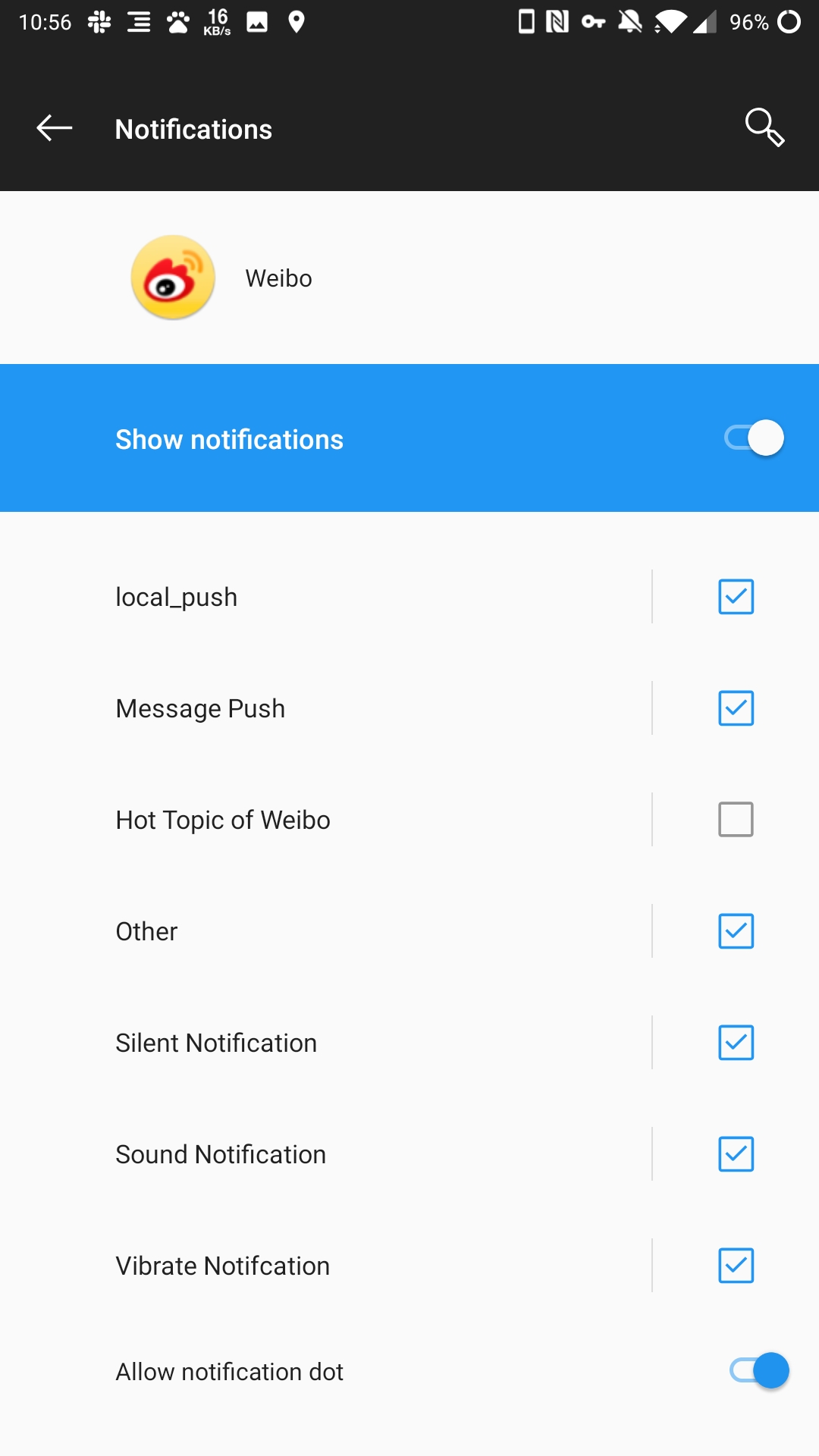
Here I've used Android 9's fine grained notification control to block the annoying "Hot Topics" notification from 微波 (weibo, the Chinese Twitter).
My biggest savior actually comes in the form of Android itself. Android 9 (Android Pie) added the ability to have fine grained control over notifications. This means I can go directly into the phone’s settings and disable an app’s notifications without having to muck around in the app itself. It also has a intelligent feature where it can identify apps whose notifications you frequently dismiss and prompt you with the option to disable those notifications, simplifying the process of taking back control of your phone.
China’s policy of isolationism and strict control has meant that it’s been able to develop it’s own robust set of solutions to the same problems we face in the West within their own economy. You get some copycats, but you also get some fabulous innovation - as I mentioned in my Beijing post the food delivery infrastructure over here is spectacular. But unique environments face unique problems, and hyper-annoying apps has been a result of the Chinese environment. I don’t actually expect this problem to get better. One might be able to claim that as the Chinese economy continues to grow and more consumers have more purchasing power they’ll move to Apple and the Android app marketplaces will have to step up their game - but I believe that most consumers have been trained now. They say that it’s easier to train a human to fit a machine than it is to code a machine to fit a human - think about how before autosave was created people used to just shrug and say “that’s how it is” when hours worth of work was lost cause of a power outage.
But maybe not! Perhaps the newest generation of tech-immersed children will be battle hardened to these app’s tactics and raise a genuine demand for change.
Shawn Li comments:
Haha, “notification” in chinese is “通知”. Android apps in China is annoying so a management app, which can put some apps to “sleep”, is essential. Like Ice Box (冰箱). This app can prevent apps from auto restart and no notifications.
Tariq Tune comments:
Funny coincidence reading this right after reading an article that discussed the Chinese government downloading secret surveillance apps on tourists phones (only for Android, since there’s no way Apple would run with that). Also related: Apple, for the first time, just published info on governments requesting apps to be taken off the apple App Store. But, I agree w/ you — more freedom also comes with less regulations… there is no end-all solution here until we can have a perfect mediator/regulator for apps. And I don’t even think that’s ever even going to be possible. Feels like it will just be a matter of time before China twists Apple’s arm until it submits more power to China on the App Store 🤷♂️
https://www.theguardian.com/world/2019/jul/02/chinese-border-guards-surveillance-app-tourists-phones
https://techcrunch.com/2019/07/02/apple-app-government-takedowns/
Eric Poon comments:
Chinese UX is different from the western one. We westerners are trained to like spaces over the content, but is it really better?
https://uxdesign.cc/content-or-white-space-chinese-vs-western-design-aesthetics-2eef79e12844
Love,
Eric